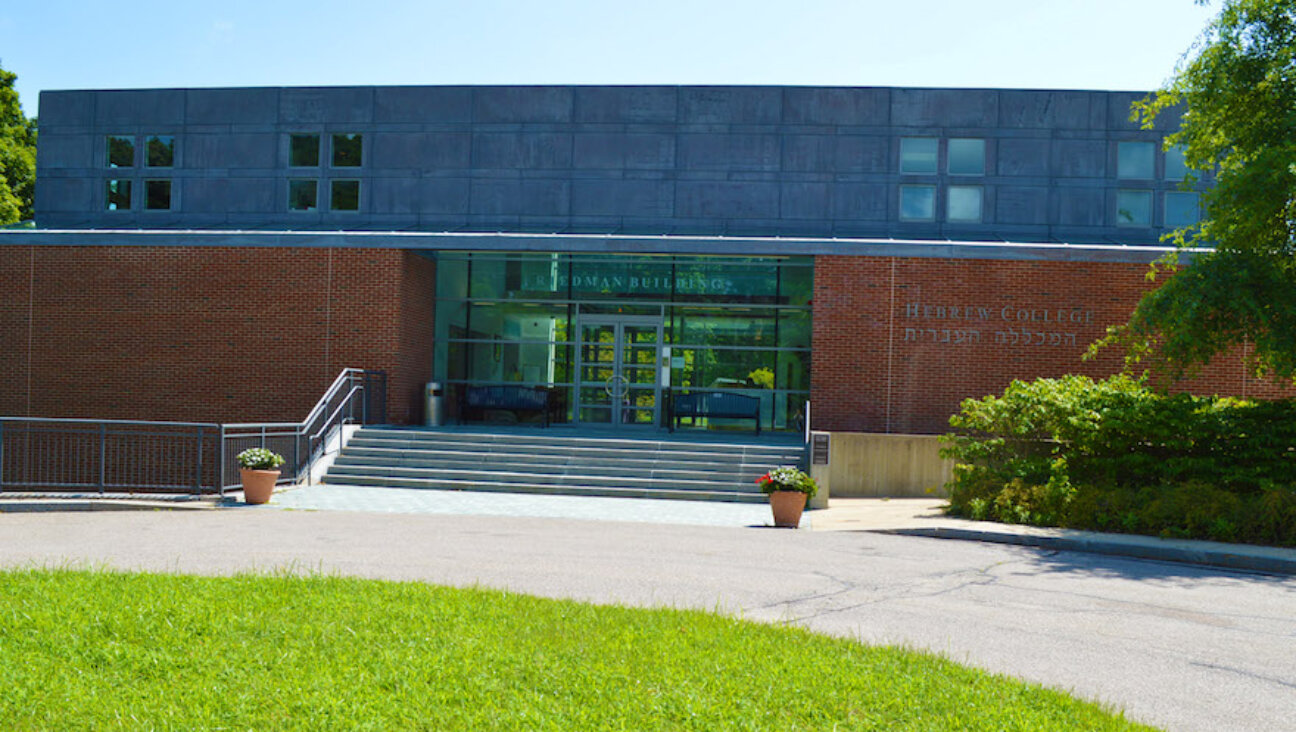June 2, 2006
Scottish Church Shows Commitment to Peace
Religion, at its purest, is the search not only for peace but also for truth. In a May 19 opinion article, Peter Kearney, national spokesman for the Catholic Church in Scotland, demonstrates a noble commitment to both (“British Academic Boycott Is Just Blinkered Bigotry”).
By appreciating that defensive measures, like the security fence, are responses to unending terrorism — Palestinian attacks whose effects are deadly and permanent, and whose cessation would make Israel’s impermanent barrier unnecessary by definition — Kearney adopts an approach that is ultimately both constructive and compassionate. It averts a senseless new “wall,” at the very least, in relations between Christians and Jews.
Sadly, this week the Church of Scotland, a Presbyterian body, took the unhelpful step of demanding the identification of products made in Jewish settlements in the West Bank. Especially at a time when Israel’s democratic leaders are undertaking an unprecedented and profoundly difficult withdrawal from such communities, a pained reaction could well be expected to any European Christian “singling out” of Jews in their biblical heartland.
By promoting unbalanced and counterproductive sanctions — such as boycotts of academics and businesses, and only those operating in Israel — political activists further increase despondency in the Middle East. Indeed, they also reinforce the equating of any empathy for Palestinians with the wholesale disregard for Israelis’ rights and very lives.
David Michaels
Director for Intercommunal Affairs
B’nai B’rith International
New York, N.Y.
Words of Peace Were Begin’s, Not Sadat’s
Prime Minister Ehud Olmert’s speech last week before a joint session of the United States Congress (“Olmert, Cheered in D.C., Bows to U.S. Call for Talks,” May 26) included this line: “Peace with Egypt became possible only after President Anwar Sadat came to [the] Knesset and declared no more war, no more bloodshed.” But Sadat said nothing of the sort in the Knesset.
What the Egyptian president did say was: “Ring the bells for your sons. Tell them that those wars were the last of wars and the end of sorrows.” It was only at a press conference the day after that he said something similar: “The two slogans that I want everyone to say are: ‘Let us have no war after October’ and ‘Let us agree upon security.’”
The phrase Olmert highlighted was authored by Israeli Prime Minister Menachem Begin. In a broadcast to the Egyptian people November 11, 1977, nine days before Sadat’s address to the Knesset, Begin said: “No more wars, no more bloodshed, and no more threats,” and he repeated it in his Knesset speech the next week.
And at the press conference the day after Sadat’s address, Begin stated: “No more war, no more bloodshed, no more attacks… let us give a silent oath, one to another: No more war, no more bloodshed, no more threats.”
Finally, at the Nobel Peace Prize ceremony in December 1978, Begin said, “No more war, no more bloodshed,” and in March 1979, during the Camp David signing ceremony at the White House, Begin declared, “No more war, no more bereavement, no more bloodshed.”
Yisrael Medad
Shiloh, Israel
Israel and America Are Different Democracies
A democratic Jewish state is, and should be, just that: a democracy that is specifically inclusive of Jews (“Immigration Tiff in Israel Splits Justices,” May 19). This is where many Jews, especially American Jews, fail to understand the difference between the United States and Israel.
The two are not politically the same. In the United States, democracy is nonspecific from its inception. Israel’s democracy is specific to Jews from its inception. The Israeli judicial decision here reflects that natural reality.
Israel is not politically or socially bound to offer American constitutional ideology to non-Jews, and certainly not to non-Israelis. The Law of Return for Jews in Israel would itself in an American context be “racist.”
Should Americans grant illegal immigrants residency based on their demand? Should Israelis be obligated to extend legal recognition of marriage and citizenship to individuals from an enemy state, in effect offering an indirect Law of Return for Arabs?
The answer is, each nation with its own democratic parameters and social dynamics has its specific issues to deal with its own way.
Israeli Arabs affected by the law barring the naturalization of Palestinians who marry Israelis shouldn’t blame Israel for the plight of their personal affairs.;they should blame the terrorist regime from where their prospective spouse originates.
A sovereign state — whether the United States or Israel — is not obligated to grant license and freedom to any and every non-citizen who demands it. These are privileges that should only be granted by democratic consent.
Americans decide about the privileges of illegal immigrants. Israelis decided about the unworthiness of granting citizenship to those from a terrorist enemy state. Both issues are addressed democratically.
Oliver Wellington
Norwalk, Conn.
Even Out of Military, Clark Still a General
The headline of a May 26 article labels Wesley Clark a “former general” (“Former General Calls for Darfur Force”). Clark is not, however, a former general — he is a retired general.
The only former generals are those who have either resigned their commissions or, more commonly, have been ejected from the military by court martial. Retired generals — and indeed all retired officers of the regular services, like myself, a retired lieutenant colonel of the U.S. Army — remain on the military rolls, are subject to the Uniformed Code of Military Justice, and can be recalled to active duty at any time.
Jai Johnson-Pickett
Kansas City Grassroots Coordinator
Jews for Clark ’04
Via e-mail
Decouple Gay Marriage From Gay Civil Rights
The logic both for and against civil marriage by lesbian, gay, bisexual and transgendered couples attempts to conflate religious marriage with civil licensing of households (“Liberals Defend Gay Marriage as Religious Right,” May 26). By arguing with the religious right on their terms, we honor their contention that liberals wish to intrude on religious marriage, in whatever sectarian form they might wish to defend.
Rather than engage on matters like whether marriage can occur only between square pegs and round holes, I propose that America take a time out. I wrote the following model proposal for my own state:
The Commonwealth of Pennsylvania recognizes that marriage is a religious rite, beyond the power of civil authority to govern, without undue interference into the religious beliefs and freedoms of its citizens. All couples that the Commonwealth has previously declared married shall henceforth be declared households.
License for a couple to become a household may be granted by the Commonwealth, and by recognized local subdivisions of Pennsylvania. All mention of “marriage” in current Pennsylvania legal codes, documents and tax provisions shall be amended to substitute “household” or “couple” for marriage. All property, inheritance and implied powers of attorney that applied to marriages shall henceforth apply to households.
Couples who wish to apply for a household shall not be restricted on the basis of race, gender or sexual preference, or of religious or political creed.
By refusing to conflate the formation of a civil household with religious baggage, we can change the terms of debate. By continuing to sing “I can do anything better than you can” in a silly duet with the religious right, we only will put everyone on the defensive.
Anyone who wishes can take their household to a religious institution to turn it into a marriage. Then we can turn our attention to more serious issues.
Ben Burrows
Elkins Park, Pa.
Be Proud of The Thing
Arts and culture writer Michael Greene claims that Kitty Pryde was the “the Marvel Universe’s first unabashedly Jewish citizen” (“Our Own Superhero: A Matter of Pryde,” May 26).
Not to take anything from Ms. Pryde, but one must take note that Ben Grimm — aka the Thing of Fantastic Four fame — is also Jewish, and even said “Shma Yisrael” out loud in the August 2002 issue. Greene mentions several Jewish comic book creators, but left out Jack Kirby, the creator of the Fantastic Four, the Incredible Hulk, Captain America and others — including the X-Men, which later recruited one Kitty Pryde.
Kirby, born Jacob Kurtzberg, was one of the geniuses who changed the way we read comics. In fact, there are periodicals and journals dedicated to Kirby’s work. Probably more critical material has been generated by aficionados and fans of Kirby than for any other comic book artist.
Rabbi Joel Berman
Ohev Tzedek Congregation
Boardman, Ohio

I hope you appreciated this article. Before you go, I’d like to ask you to please support the Forward’s award-winning journalism this Passover.
In this age of misinformation, our work is needed like never before. We report on the news that matters most to American Jews, driven by truth, not ideology.
At a time when newsrooms are closing or cutting back, the Forward has removed its paywall. That means for the first time in our 126-year history, Forward journalism is free to everyone, everywhere. With an ongoing war, rising antisemitism, and a flood of disinformation that may affect the upcoming election, we believe that free and open access to Jewish journalism is imperative.
Readers like you make it all possible. Right now, we’re in the middle of our Passover Pledge Drive and we need 500 people to step up and make a gift to sustain our trustworthy, independent journalism.
Make a gift of any size and become a Forward member today. You’ll support our mission to tell the American Jewish story fully and fairly.
— Rachel Fishman Feddersen, Publisher and CEO
Join our mission to tell the Jewish story fully and fairly.
Our Goal: 500 gifts during our Passover Pledge Drive!
























